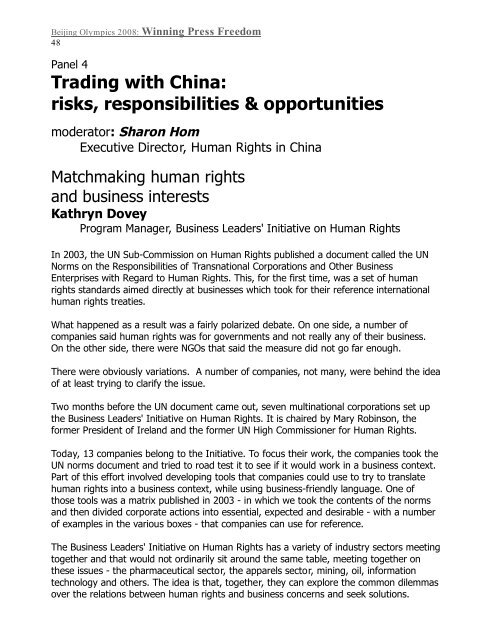Beijing Olympics 2008: Winning Press Freedom - World Press ...
Beijing Olympics 2008: Winning Press Freedom - World Press ...
Beijing Olympics 2008: Winning Press Freedom - World Press ...
You also want an ePaper? Increase the reach of your titles
YUMPU automatically turns print PDFs into web optimized ePapers that Google loves.
<strong>Beijing</strong> <strong>Olympics</strong> <strong>2008</strong>: <strong>Winning</strong> <strong>Press</strong> <strong>Freedom</strong><br />
48<br />
Panel 4<br />
Trading with China:<br />
risks, responsibilities & opportunities<br />
moderator: Sharon Hom<br />
Executive Director, Human Rights in China<br />
Matchmaking human rights<br />
and business interests<br />
Kathryn Dovey<br />
Program Manager, Business Leaders' Initiative on Human Rights<br />
In 2003, the UN Sub-Commission on Human Rights published a document called the UN<br />
Norms on the Responsibilities of Transnational Corporations and Other Business<br />
Enterprises with Regard to Human Rights. This, for the first time, was a set of human<br />
rights standards aimed directly at businesses which took for their reference international<br />
human rights treaties.<br />
What happened as a result was a fairly polarized debate. On one side, a number of<br />
companies said human rights was for governments and not really any of their business.<br />
On the other side, there were NGOs that said the measure did not go far enough.<br />
There were obviously variations. A number of companies, not many, were behind the idea<br />
of at least trying to clarify the issue.<br />
Two months before the UN document came out, seven multinational corporations set up<br />
the Business Leaders' Initiative on Human Rights. It is chaired by Mary Robinson, the<br />
former President of Ireland and the former UN High Commissioner for Human Rights.<br />
Today, 13 companies belong to the Initiative. To focus their work, the companies took the<br />
UN norms document and tried to road test it to see if it would work in a business context.<br />
Part of this effort involved developing tools that companies could use to try to translate<br />
human rights into a business context, while using business-friendly language. One of<br />
those tools was a matrix published in 2003 - in which we took the contents of the norms<br />
and then divided corporate actions into essential, expected and desirable - with a number<br />
of examples in the various boxes - that companies can use for reference.<br />
The Business Leaders' Initiative on Human Rights has a variety of industry sectors meeting<br />
together and that would not ordinarily sit around the same table, meeting together on<br />
these issues - the pharmaceutical sector, the apparels sector, mining, oil, information<br />
technology and others. The idea is that, together, they can explore the common dilemmas<br />
over the relations between human rights and business concerns and seek solutions.





